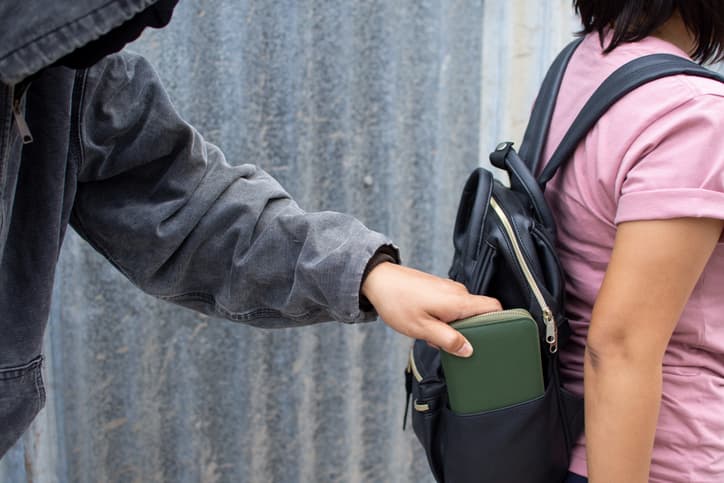Long Thought a Relic of the Past, Pickpocketing Returns to New York Along With Migrants
Pickpocketing is ‘seen as income redistribution’ by the district attorney’s office, a former police commissioner says. ‘Police know it’s not going to be prosecuted.’

Pickpocketing is back in business in the Big Apple. It’s a crime that many New Yorkers long ago forgot about, but formal complaints are rising and migrant pickpocketing crews are making their presence known. The misdemeanor is making a comeback.
There have been 781 pickpocketing complaints this calendar year as of June 9, the New York Police Department tells the Sun. At the same time last year, that number stood at 650 complaints — and those are just the incidents that are reported to the police.
The pickpockets have “emanated from South America,” particularly from “schools in Colombia that teach this,” a former police commissioner of New York City, Raymond Kelly, tells the Sun.
“There is a core group of people that do this,” and the problem has been “augmented by migrants,” Mr. Kelly says. Even as the problem grows, it often goes unreported because people think they simply lost their wallets, he adds.
The pickpockets, though, are less skilled than those of the past, Mr. Kelly says, which makes one wonder why the crime is a growing problem. A key part of the answer, he explains, lies in the prosecutions — or lack thereof.

New York’s district attorney, Alvin Bragg, “has put out his manifesto on day one: ‘Decarceration is the way to go’ is his mantra,” Mr. Kelly says.
Pickpocketing is “seen as income redistribution” by the DA’s office and the city council, Mr. Kelly says. “Police know it’s not going to be prosecuted,” he says.
Prosecutors are “declining to pursue cases because they know the barrier is high and the burden is on them,” the director of policing and public safety at the Manhattan Institute, Hannah Meyers, tells the Sun. When cases are declined for prosecution, they aren’t counted in the crime data.
Pickpockets, among other offenders, know the prosecutors have stopped going after them, thus lessening “deterrence for low-level felonies and misdemeanors,” Ms. Meyers says.
“There are no consequences for virtually anything these days,” Mr. Kelly says. “Over 50 percent of felonies presented” to Mr. Bragg “have been downgraded to misdemeanors.”
The problem goes back to reforms to the discovery statute of the city’s criminal procedure law. The new rules, which went into effect in January 2020, “put the burden on the prosecutor” by requiring “every piece of information” before trial, Ms. Meyers says.
Police “can no longer arrest and arraign on the spot,” and instead must issue desk appearance tickets, Ms. Meyers says, creating another barrier to punishing misdemeanors. The problem is multiplied by public rhetoric that minimizes property crime, she adds.
One potential solution is known as broken windows policing. The strategy involves punishing low-level crimes with an eye on preventing serious ones. It creates a “positive feedback deterrent effect,” Ms. Meyers says.
The concept of “broken windows” dates back to a 1982 article by George Kelling and James Wilson in which they claim that a criminal will be more likely to loot a building with a broken window than one without. Mayor Giuliani and a former police commissioner, William Bratton, put the theory into practice and popularized it by cracking down on New York City’s petty crime in the 1990s.
Broken window policing went out of style under Mayor de Blasio. The combination of discovery reform and elimination of cash bail for most misdemeanors in 2019 marked an even greater shift away from the concept.
“It’s bad for the community, families, and the victims,” Ms. Meyers says of the shift to not prosecuting minor offenses. “It breaks down the fabric of trust among citizens.”
“I don’t think it’s going to change in the short term,” Mr. Kelly says when asked if he has hope for reductions in pickpocketing. “Change can only take place if elections happen,” such as in “the anti-police city council and DA office.”

